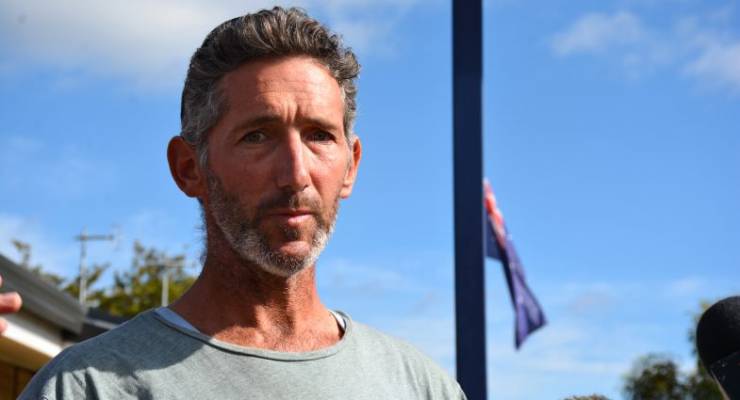
Aaron Cockman, the father of four children killed near Margaret River, WA.
Imagine being in an Australian newsroom last Friday. News breaks of several bodies discovered at an idyllic rural property in WA. Editors throwing away the playbook for the day, journalists jumping in company cars and on flights to a town outside Margaret River. Most would know no one in the town, have very little context for the crimes and are told only what the police are willing to reveal. They also face pressure to capture the biggest mass shooting in Australia since the Port Arthur Massacre.
All of this goes to explain the coverage of the tragic deaths of the Miles family at the hand of grandfather Peter. The story is only a few days old, but already contradictory stories are being told.
As of Monday morning, the primary account is coming from Aaron Cockman, the ex-husband of the deceased mother in the family, Katrina Miles.

Cockman, we are told, knows the mindset of alleged murderer Peter Miles. Cockman, we are told, waited patiently on Sunday until every last camera operator and journalist assembled for the press conference before he addressed the pack, to the surprise of police.
He explained Peter Miles’ “heartache” at a son’s suicide and his more recent devastation at another child’s health problems. “Peter didn’t snap,” he said. “He’s thought this through. I think he’s been thinking this through for a long time. All the kids died peacefully in their beds.”
Cockman’s words are quoted fulsomely on the ABC, the Fairfax outlets, The West Australian, The Australian and virtually every other outlet. Cockman’s full statement is put online.
Is this the only story?
The forthcoming grieving father is a new role for Cockman in the story of this story. Earlier reports portrayed him in a completely different light. A report in The Australian detailed his alleged harassment of Katrina Miles in recent days, his dissatisfaction with their breakup and her decision to home school their four autistic children:
The massacre came after weeks of tension between Ms Miles and her ex-husband Aaron Cockman. On the morning of April 23, Ms Miles told friends on Facebook that Mr Cockman had parked overnight outside her property and remained there after being asked to leave. “Despite four years passing … him agreeing to our kids being homeschooled … my ex does not stop stalking and harassing me,” she wrote.
‘I’ve been told to not cause conflict in front of my kids but my family shouldn’t have to spend their Sunday night dealing with this. He stayed overnight, parked on the side of the road, opposite our top corner boundary; spoke to my kids via phone about 5pm to inform us, he was asked to leave but was still there at 7am. I am not an isolated young wife anymore. If anyone sees his van parked on Osmington Rd please call the ranger to move him on.’
In her Facebook message, Ms Miles posted a string of text messages she received from Mr Cockman the previous evening. Among them, he said: ‘Can I talk to the kids’; ‘Or are you to (sic) messed up’; ‘I will be here every night’.
None of these details were prominent in the Monday morning coverage.
How did the media pivot so quickly? How did they turn a man who allegedly stalked his ex-wife into the most important commentator on the death of that same woman and her entire family?
For most of the over-worked, under-resourced reporters sent out on stories like this, the competition is fierce and the information vacuum is vast. A small town overrun with journalists will see some locals soak up the national attention. Initial impressions rarely capture the nuances, but a journalist’s job must go on. As Janet Malcolm writes in The Journalist and the Murderer:
Unlike other relationships that have a purpose beyond themselves and are clearly delineated as such (dentist-patient, lawyer-client, teacher-student), the writer-subject relationship seems to depend for its life on a kind of fuzziness and murkiness, if not utter covertness, of purpose. If everybody put his cards on the table, the game would be over. The journalist must do his work in a kind of deliberately induced state of moral anarchy.
A potent combination of factors has left us with Cockburn’s version of events dominating the news cycle. That account will last at least until the likely coronial inquest and potentially beyond. Removing the moral murkiness remains as ever, up to us, the readers.
You can reach Lifeline on 13 11 14. If you or someone you know is impacted by domestic or family violence, call 1800RESPECT on 1800 737 732 or visit 1800RESPECT.org.au. In an emergency, call 000.








Crikey is committed to hosting lively discussions. Help us keep the conversation useful, interesting and welcoming. We aim to publish comments quickly in the interest of promoting robust conversation, but we’re a small team and we deploy filters to protect against legal risk. Occasionally your comment may be held up while we review, but we’re working as fast as we can to keep the conversation rolling.
The Crikey comment section is members-only content. Please subscribe to leave a comment.
The Crikey comment section is members-only content. Please login to leave a comment.